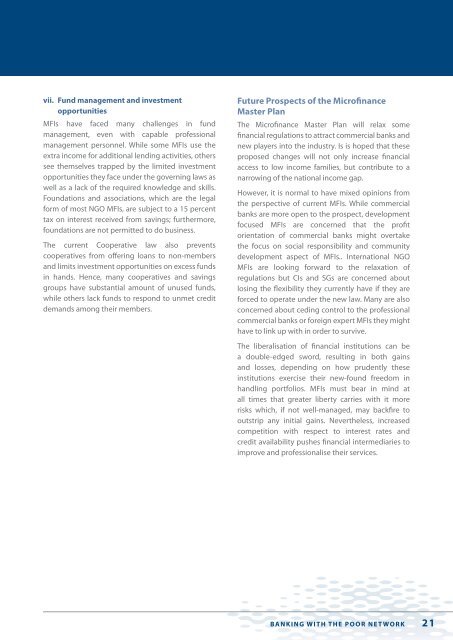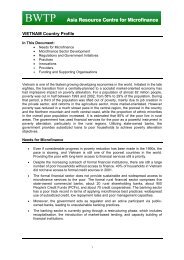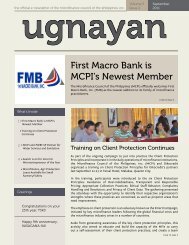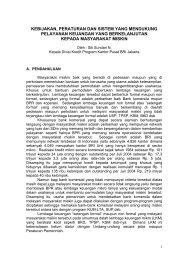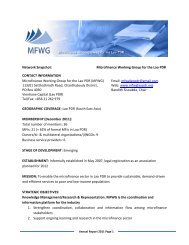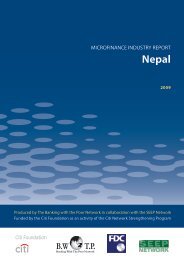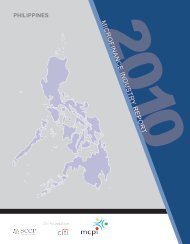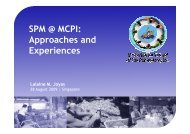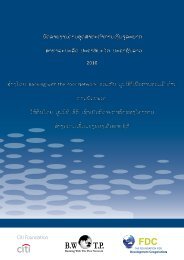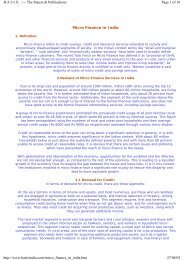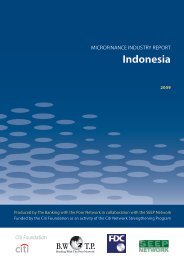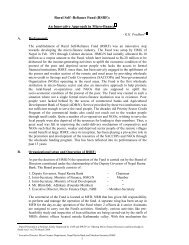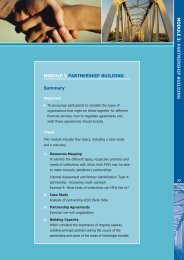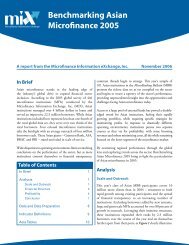MICROFINANCE INDUSTRY REPORT Thailand - Banking with the ...
MICROFINANCE INDUSTRY REPORT Thailand - Banking with the ...
MICROFINANCE INDUSTRY REPORT Thailand - Banking with the ...
Create successful ePaper yourself
Turn your PDF publications into a flip-book with our unique Google optimized e-Paper software.
vii. Fund management and investmentopportunitiesMFIs have faced many challenges in fundmanagement, even <strong>with</strong> capable professionalmanagement personnel. While some MFIs use <strong>the</strong>extra income for additional lending activities, o<strong>the</strong>rssee <strong>the</strong>mselves trapped by <strong>the</strong> limited investmentopportunities <strong>the</strong>y face under <strong>the</strong> governing laws aswell as a lack of <strong>the</strong> required knowledge and skills.Foundations and associations, which are <strong>the</strong> legalform of most NGO MFIs, are subject to a 15 percenttax on interest received from savings; fur<strong>the</strong>rmore,foundations are not permitted to do business.The current Cooperative law also preventscooperatives from offering loans to non-membersand limits investment opportunities on excess fundsin hands. Hence, many cooperatives and savingsgroups have substantial amount of unused funds,while o<strong>the</strong>rs lack funds to respond to unmet creditdemands among <strong>the</strong>ir members.Future Prospects of <strong>the</strong> MicrofinanceMaster PlanThe Microfinance Master Plan will relax somefinancial regulations to attract commercial banks andnew players into <strong>the</strong> industry. Is is hoped that <strong>the</strong>seproposed changes will not only increase financialaccess to low income families, but contribute to anarrowing of <strong>the</strong> national income gap.However, it is normal to have mixed opinions from<strong>the</strong> perspective of current MFIs. While commercialbanks are more open to <strong>the</strong> prospect, developmentfocused MFIs are concerned that <strong>the</strong> profitorientation of commercial banks might overtake<strong>the</strong> focus on social responsibility and communitydevelopment aspect of MFIs.. International NGOMFIs are looking forward to <strong>the</strong> relaxation ofregulations but CIs and SGs are concerned aboutlosing <strong>the</strong> flexibility <strong>the</strong>y currently have if <strong>the</strong>y areforced to operate under <strong>the</strong> new law. Many are alsoconcerned about ceding control to <strong>the</strong> professionalcommercial banks or foreign expert MFIs <strong>the</strong>y mighthave to link up <strong>with</strong> in order to survive.The liberalisation of financial institutions can bea double-edged sword, resulting in both gainsand losses, depending on how prudently <strong>the</strong>seinstitutions exercise <strong>the</strong>ir new-found freedom inhandling portfolios. MFIs must bear in mind atall times that greater liberty carries <strong>with</strong> it morerisks which, if not well-managed, may backfire tooutstrip any initial gains. Never<strong>the</strong>less, increasedcompetition <strong>with</strong> respect to interest rates andcredit availability pushes financial intermediaries toimprove and professionalise <strong>the</strong>ir services.<strong>Banking</strong> With The Poor Network 21


